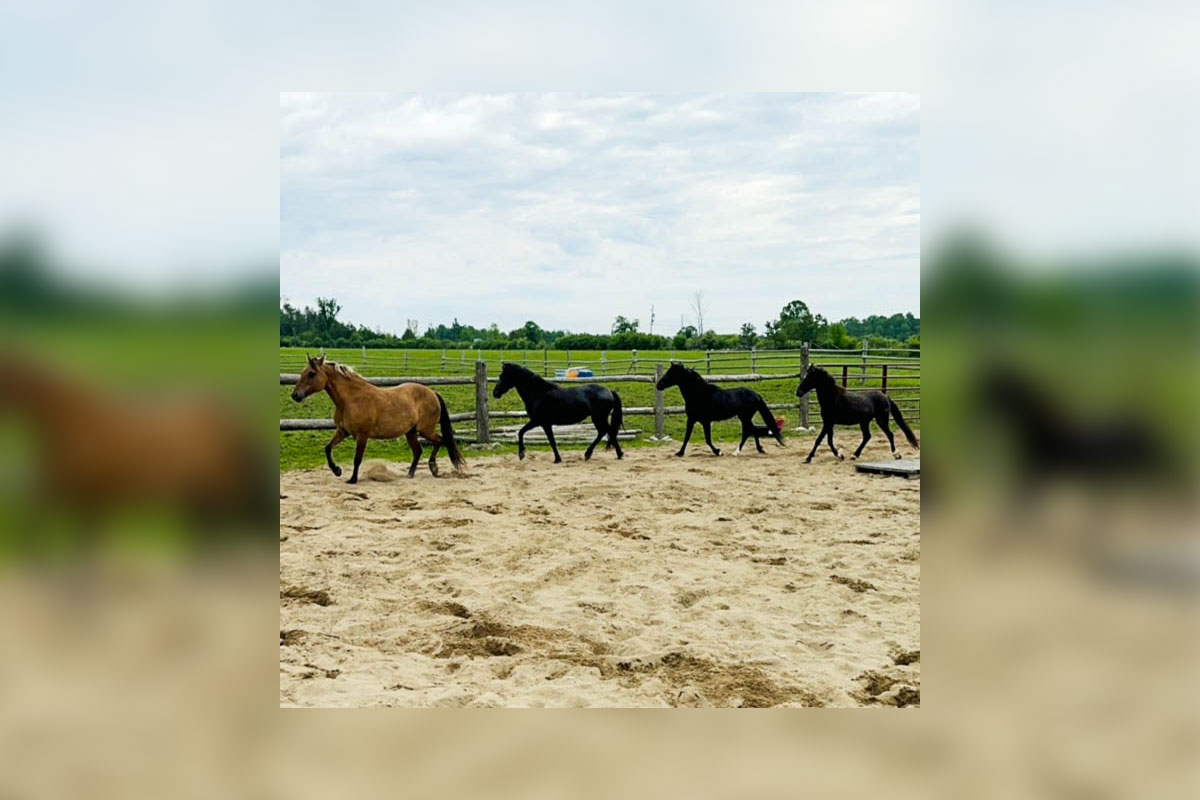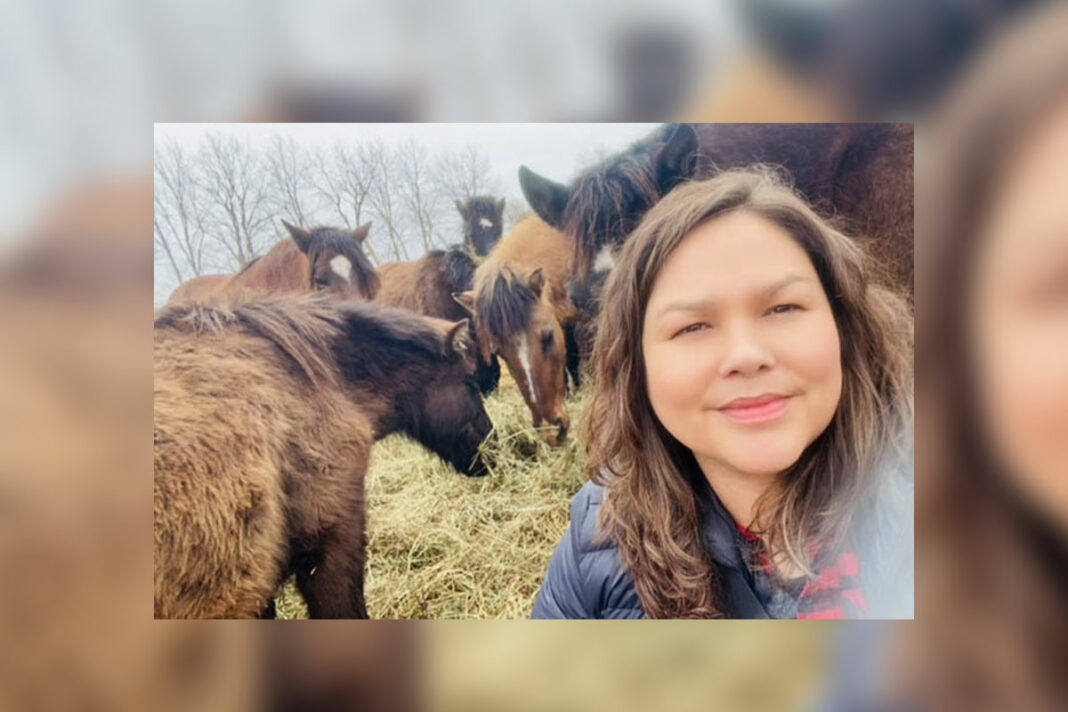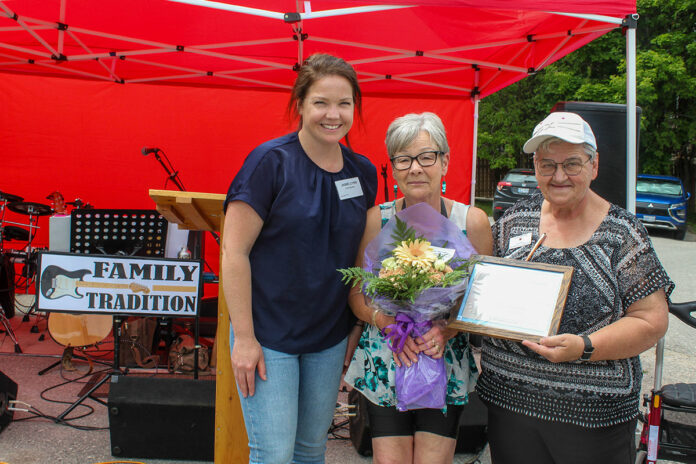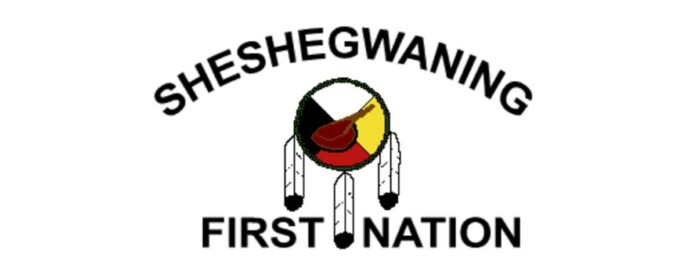WIIKWEMKOONG—Marcia Manitowabi’s dream of welcoming her peoples nearly extinct Ojibwa Spirit Horses, also known as Lac La Croix Indigenous Ponies, back to Wiikwemikoong has come true as of June 4 of this year.
An official welcoming ceremony was held on June 8 inviting Wiikwemkoong members to reconnect with these sacred horses. Three mares named Lucy, Three Sisters and Thundercloud, along with a gelding named Kind Moon Dancer, nicknamed Giizis (Ojibwe for “moon”) now call Wiikwemkoong home.
Canada’s only Indigenous horse breed, the Ojibwa Spirit Horses, are both precious and endangered. By 1977, only four mares stood as the last sentinels of their kind. Their population had dwindled to a mere whisper on the wind, making the dream of sustaining a viable band of Indigenous horses, seem distant.
In a daring rescue, community members from Bois Forte and Lac La Croix loaded these noble horses onto a trailer and whisked them away across a frozen lake to a private property in Minnesota. There, a breeding program with Spanish Mustang stallions was initiated and continues to this day. Despite these efforts, fewer than 200 Ojibwa Spirit Ponies remain. Their existence still precariously balanced on the edge of survival.
Lucy, the eldest mare, who now lives in Wiikwemkoong, is registered as a direct descendant of the originals that were spirited away to the farm in Minnesota.
The modern breed name honours the Lac La Croix First Nation of Ontario, where these horses were last seen roaming free. Their decline was driven by habitat loss due to human settlement encroachment, industrial farming, a lack of recognition as a distinct breed, and Canadian government policies aimed at forced assimilation of Indigenous peoples and lands, eroding traditional practices, including the maintenance of their ponies.

Terry Jenkins of TJ Stables in Chatham, Ontario, purchased a band of sixteen of these spectacular horses from renowned Anishinaabe artist and advocate, Rhonda Snow. Snow is credited not only with working tirelessly with breeders to establish educational and equine-assisted learning programs, but also with interviewing Elders and Knowledge Keepers to compile the oral history of the symbiotic relationship between Indigenous peoples and Ojibwe ponies.
Ms. Manitowabi recalls that Ms. Jenkins, who grew up near Walpole Island, had heard that Rhonda Snow was seeking homing opportunities for Ojibwe ponies within communities of Ojibwe peoples that might be equipped to care for them, appropriately. Ms. Jenkins then began touring the province, teaching different communities about the breed and their history as part of an Indigenous Tourism initiative.
“When the Spirit Horses came to Wiky, I had already been working in Equine Therapy in Sudbury,” said Ms. Manitowabi. “My auntie called me up and asked if I was going to visit them. I was amazed! Like, ‘oh my god, we have our own ponies?’ I had been unaware the breed existed before then.”
Ms. Manitowabi participated in a water ceremony, within which the sacred horses were guided around the Midewiwin Lodge by their handlers and then to the water, where she helped to bathe them ceremonially.
“From then on, the horses were always on my mind,” she said.
“I kind of started stalking Terry,” Ms. Manitowabi laughed. “She does great work with the Canadian Cowgirls organization and goes around to rodeos showing what these horses are capable of. So I just kept visiting the rodeos and talking to her like, ‘hey remember me?’”
Ms. Jenkins and Ms. Manitowabi maintained lengthy conversations about bringing the horses back to the ancestral communities and the importance of reviving the relationship of Indigenous horse husbandry.
Initially, Ms. Manitowabi suggested a five-year timeline, but Jenkins proposed two years.
“I had to put everything into my work with them and lay the groundwork to ensure I was ready to take responsibility for them. I was traveling back and forth between Sudbury and Wiikwemkoong for work.” Ultimately, COVID-19 delayed their plans, taking four years to bring the plan to fruition.
Caring for the horses has now become a collaborative effort, with members of Manitowabi’s family helping while she is away. She has since shifted her focus from Equine Therapy to a more holistic, traditional Anishinabek-centered practice with the Ojibwe ponies.
“For me, it’s about bringing these horses back to work to aid healing within our community. I have witnessed firsthand how they help us. This isn’t a riding program; it’s about our people connecting to the horses and allowing themselves to let go. Not many people remember the history of these ponies. By connecting with them, we are reclaiming parts of ourselves that we might not have even known were lost,” Ms. Manitowabi emphasized.
Ms. Manitowabi, who works at Shkagamik Kwe Health Centre in Sudbury, has also launched her own project, Reflections Nanaandwejgejig Bezhigoogizhiik which translates to ‘healing horses’. The project centres around the horses ability to aid with mental wellness recovery from issues like anxiety, depression, aggression and addictions.
Group sessions will be offered to the First Nations communities of Manitoulin Island over the summer, including two Indigenous youth culture camps and programming in collaboration with the Wiikwemkoong Peacemaker Justice Program, whose mandate is to aid Indigenous communities by employing traditional restorative justice measures.
During Wiikwemkoong’s Midewiwin ceremonies this past weekend, Manitowabi met a man from the Lac La Croix community, who was excited to meet the horses his community had nearly single-handedly preserved.
“Our Anishinaabek territory is vast, and historically, we would have encountered and known about these horses,” Ms. Manitowabi said. “Part of my work with these horses is to learn more about their history and stories. As we Anishinaabe search for our identity, these ponies help us understand who we were, who we are and how to move forward as a people.”
To learn more about sessions and services, or if you or someone you know holds traditional stories about Ojibwe Spirit Horses, please contact Marcia Manitowabi:
Contact Ms. Manitowabi at www.real-program.com, realprogram2021@gmail.com
or by calling (705) 561-1880.






